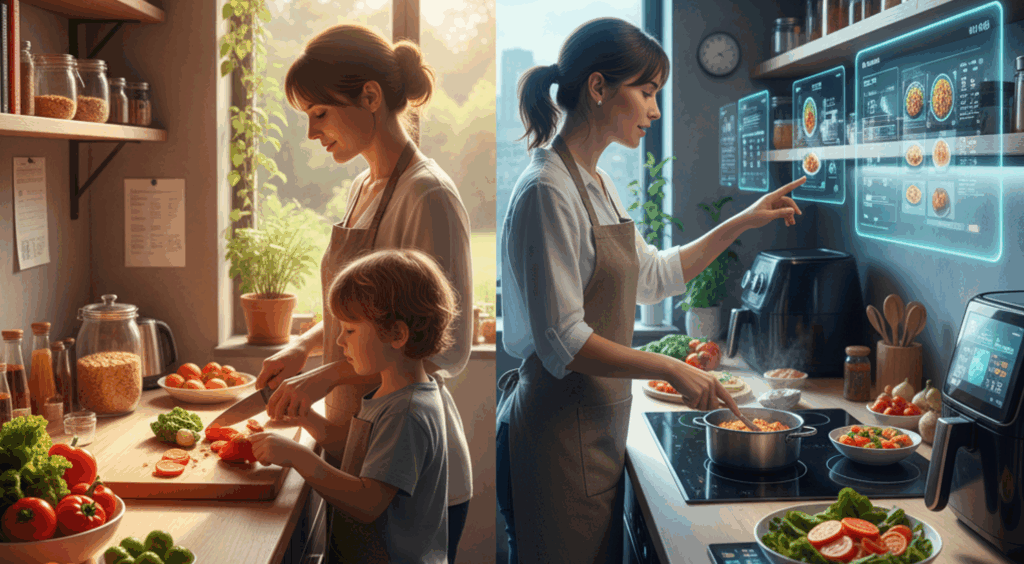Healthy Cooking at Home in 2025: Simple Strategies for Real-Life Success
Cooking at home isn’t just about saving money or knowing what’s in your food—it’s become a cornerstone of healthier living, especially as people seek balance in a fast-paced, tech-driven world. In 2025, the tools and resources available for home cooks are more diverse and accessible than ever, but the basics of making nutritious, satisfying meals haven’t changed as much as you might think. If you’re looking to eat better without spending hours in the kitchen or sacrificing flavor, here’s a detailed guide to building sustainable, healthy cooking habits that actually fit real life.
Why Home Cooking Still Matters
With meal delivery apps and ultra-processed convenience foods everywhere, it’s easy to forget the benefits of preparing your own meals. Home cooking puts you in control of ingredients, portion sizes, and nutrition, helping you avoid hidden sugars, sodium, and additives. It’s also a chance to slow down, connect with family or roommates, and turn a daily necessity into a creative outlet. Many people find that cooking at home leads to better digestion, more energy, and even improved mental health—there’s something grounding about chopping vegetables or stirring a simmering pot after a long day.
Getting Started: Stocking a Smart Pantry
The foundation of healthy cooking is a well-stocked pantry. In 2025, more people are focusing on whole, minimally processed staples—think brown rice, lentils, canned beans, quinoa, oats, and whole grain pasta. Keep a variety of herbs and spices on hand to boost flavor without relying on salt or heavy sauces. Healthy oils (like olive or avocado), canned tomatoes, nuts, and seeds are pantry MVPs. Fresh produce is always best, but frozen vegetables and fruits are a budget-friendly backup, especially when certain items are out of season.
Embracing Technology: Smart Tools and Digital Resources
One of the biggest changes in recent years is how technology supports home cooks. Smart kitchen devices—like digital scales, instant-read thermometers, and air fryers—make it easier to prepare meals with precision and less guesswork. Recipe apps and digital meal planners can suggest dishes based on what you have on hand, help you track nutrition, and even generate grocery lists. Voice assistants can walk you through recipes step by step, freeing up your hands for chopping or stirring. While you don’t need every gadget on the market, a few well-chosen tools can make healthy cooking faster and more enjoyable.
Simple Meal Planning: The Key to Consistency
The secret to eating well at home isn’t complicated recipes—it’s planning ahead. Spend a few minutes each week mapping out meals, focusing on dishes that share ingredients to minimize waste. Batch-cooking grains or proteins, prepping veggies in advance, and embracing leftovers all help save time. Many people find that having a few “go-to” recipes—like a hearty soup, a stir-fry, or a sheet-pan dinner—takes the stress out of busy nights. Don’t be afraid to repeat favorites; variety is great, but consistency is what builds lasting habits.
Making Healthy Cooking Enjoyable, Not a Chore
If cooking feels like a burden, it’s hard to stick with it. Find ways to make the process enjoyable: put on your favorite playlist, cook with a friend or family member, or try a new ingredient each week. Celebrate small wins, like mastering a new technique or discovering a dish everyone loves. Remember, not every meal needs to be Instagram-worthy. Some of the healthiest, most satisfying meals are the simplest—think roasted vegetables, a big salad with a homemade vinaigrette, or a comforting bowl of whole grain porridge.
Overcoming Common Roadblocks
Everyone hits snags—lack of time, picky eaters, or the temptation of takeout. The key is to have backup plans: keep a few healthy frozen meals or prepped ingredients on hand for emergencies. If you’re short on time, focus on one-pot or sheet-pan recipes that minimize cleanup. For families, involve kids in meal prep or let everyone choose a “theme night” to keep things interesting. And if you slip up and order pizza, don’t sweat it—healthy cooking is about progress, not perfection.
Final Thoughts: Building Habits That Last
Healthy cooking at home in 2025 is less about strict diets and more about making small, sustainable changes that add up over time. Start with simple recipes, stock your kitchen with wholesome staples, and use technology to your advantage. Most importantly, give yourself grace—habits take time to build, and every meal you make is a step toward better health. Whether you’re a seasoned cook or just starting out, the kitchen can be a place of creativity, nourishment, and real-life success.



Some truly howling work on behalf of the owner of this web site, perfectly outstanding subject matter.